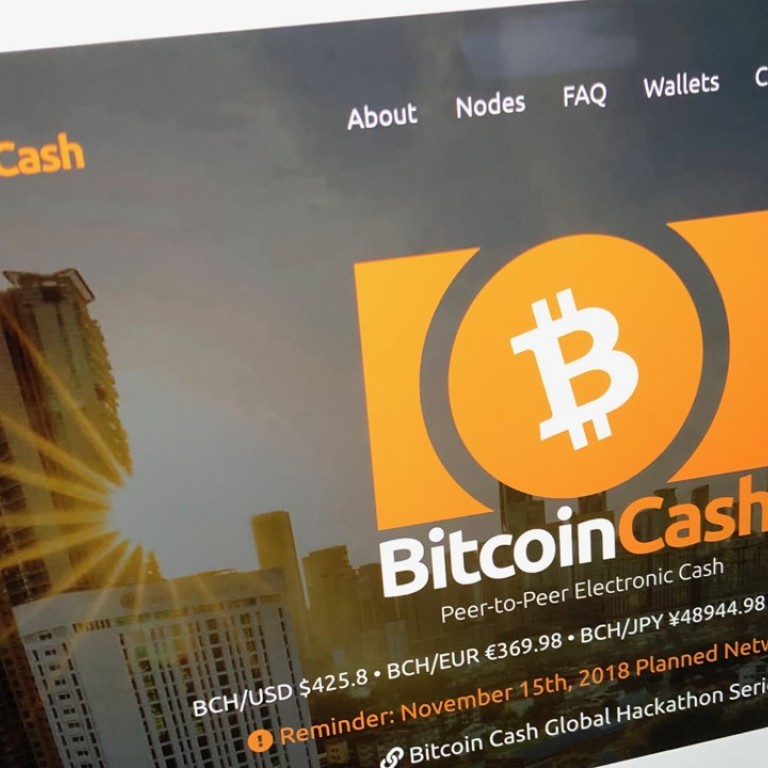
Bitcoin cash “hard fork”: everything you need to know about the latest cryptocurrency civil war
- Bitcoin cash, the world’s No. 4 cryptocurrency, split into two separate entities on November 16, highlighting fundamental disagreements in the community
- Bitcoin tumbled below US$6,000 to its lowest level in over a year
Imagine you have a dollar in your wallet, and you put it aside for a while and then realise that one coin has split in two. Sounds weird? Not in the cryptocurrency world.
Here’s all you need to know about the split, known as the bitcoin cash “hard fork”.
What is bitcoin cash?
Bitcoin functions like a software program, but unlike Microsoft Office, there’s no single entity who determines how it should be updated. Over the past few years, the bitcoin infrastructure has been struggling to handle a surge in transactions and community members have come up with various options to solve the backlog. Most of the time, these new updates coexist with each other. An analogy would be that you can use Microsoft Word 2016 or 2013 or 2000 to access the same document, although some functions may not be available in the older versions.
But bitcoin cash is like a new version of Microsoft Word, which generates documents that can no longer be opened via the older versions. In August 2017 bitcoin cash emerged from the original bitcoin in an event known as a “hard fork”. At the time of the fork, anyone who owned bitcoin also inherited an equal amount of bitcoin cash.
What’s the difference between bitcoin and bitcoin cash?
Bitcoin’s innovation lies in its blockchain – a public ledger of every single bitcoin transaction that has ever taken place, with the information being recorded in blocks of data chained together chronologically. But there’s a limit to the number of transactions that each block can be filled with, seen as an effort to keep attackers from disrupting the network with multiple entries even though it slows things down. Currently, the bitcoin network can process up to 7 transactions per second, compared to tens of thousands for Visa.
At the time of its birth, bitcoin cash offered an eight-fold increase in transaction capacity by expanding bitcoin’s block size cap to 8 MB from 1 MB. Its name alludes to the broader argument that the real bitcoin ought to be a payment system that everyday people use to buy their coffee – rather than a technical store of value due to its finite supply like gold, as others believe.
Bitcoin cash is now the world’s fourth-largest cryptocurrency, with a total market cap of US$7 billion, about 7 per cent of bitcoin’s value, according to data from CoinMarketCap.
Why has bitcoin cash split again?
There are two competing versions of updates for bitcoin cash with rules incompatible with each other. The new “hard fork” just happened on November 16 at around 2am Hong Kong time.
One version is called Bitcoin ABC, favoured by Ver and Wu. One of the key features of this upgrade is to move bitcoin cash beyond money transfers to support smart contacts – digital agreements that execute automatically when certain conditions are satisfied. This is likely to pave the way for developers to build applications on top of the bitcoin cash network – something they can already do on other blockchains, such as ethereum.
The proposal maintains the block size of bitcoin cash at 32 MB. But Team ABC, which stands for “Adjustable Blocksize Cap”, is in favour of eventually removing the block size limit.
The opposing faction is called Bitcoin SV, which stands for “Satoshi’s Vision” and is led by Wright, the self-proclaimed bitcoin creator. Wright argues bitcoin cash should be used solely as a form of “stable global money”, a true reflection of the ideals behind bitcoin’s foundation. He proposes to set the block size at 128 MB in order to scale the cryptocurrency.
It’s ultimately up to miners – who process transactions in return for new units of cryptocurrency as reward – to decide what they want to do with their computing (sometimes called hash) power. In short, whichever version gets most hash power will likely survive by itself. Another outcome could be that the two coins exist side-by-side.
Who will win?
What’s the reaction so far?
Most major cryptocurrency exchanges support the split, meaning they took snapshots of all customer bitcoin cash balances in case they need to be credited with the same amount of the new spin-off. But they suspended bitcoin cash withdrawals and deposits before the fork until the network resumes stable operations.
Bitcoin cash rallied at one point as investors bet that the fork will leave them with two kinds of coins. But amid the hash war, the cryptocurrency market suffered a sharp fall, with its total value dropping below the US$190 billion mark for the first time in two months, according to CoinMarketCap.
Bitcoin plunged more than 10 per cent on the eve of the fork, and is now trading at around US$5,600, its lowest level in over a year.

